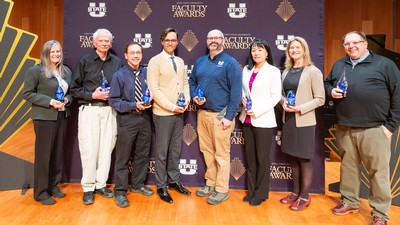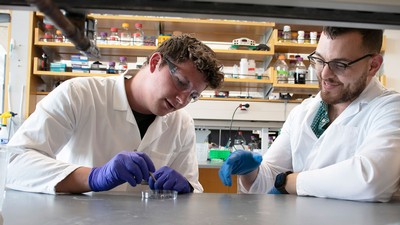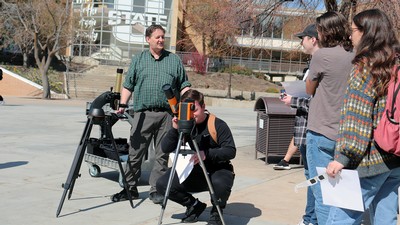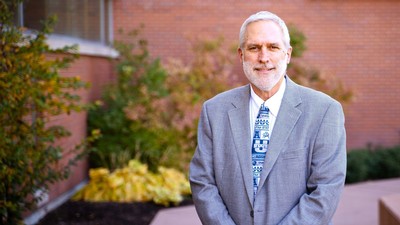Uncertainty Aside, COVID-19 can Help Strengthen our Resiliency, Relationships
By Janelle Hyatt |
Emily Colby and Linnea Leonard, student producers for Utah Public Radio's Access Utah program, establish digital connection with participants, all authorities on maintaining resiliency, for a broadcast focusing on "Remaining Resilient Through COVID-19."
This moment in our history is, without doubt, difficult and uncertain.
It’s also, says social worker Vonda Jump-Norman, an “unprecedented opportunity that we may never have again.”
Appreciate the relationships in your life, she said. Be of service. Play a game with the kids. Reflect. Be grateful. Reach out for the many resources our communities provide.
For Jump-Norman, an assistant professor of social work in the College of Humanities and Social Services, these activities define resiliency. She thinks of resiliency more broadly, and more personally, than what’s given to us by dictionaries: rebounding from adversity, for instance, or pushing up to your feet in the 10th round.
“For me,” she said, “resilience is doing well in the space of something that's very difficult, and you don’t know the outcome. It’s not necessarily a given that you're going to do well, but you do.”
Jump-Norman also serves as director of the Trauma Resiliency Project at The Family Place. An authority on this whole concept of coping with grace, Jump-Norman was joined by two other such experts for a broadcast this week hosted by Tom Williams on Utah Public Radio’s daily interview show, Access Utah. Their topic was “Remaining Resilient Through COVID-19.”
Our state of mind, said Jump-Norman, “depends on what we're focusing on.” We feel better, she adds, “when we’re thankful for the things we have and the relationships we have. We can express gratitude on a daily basis and focus on the things that are positives in our lives.”
Kevin Webb is co-director of a new center based in CHaSS that teaches people to connect with their own selves to curtail the effects of outside noise. He acknowledges the challenges that come with being restricted to interaction with, largely, family members.
“That can lead to conflict. It can lead to increased agitation and irritation,” said Webb, a licensed social worker and associate director of the I-System Institute for Transdisciplinary Studies.
“So it's important that we do things to help offset that and help each other stay healthy mentally as well as physically,” he said.
Webb, Jump-Norman, and Matthew Wappett, director of the USU Center for Persons with Disabilities, offer suggestions to increase resiliency.
The first idea is, granted, difficult. Reach out, even when your brain screams no.
“Reaching out can be really hard for a person, particularly if they're feeling isolated,” said Jump-Norman. “When we’re in that moment when we feel isolated or feeling really alone, that's probably one of the hardest time to actually reach out.”
This profound human need was described this way by author E.M. Forster in his book Howard's End: “Only connect! … Live in fragments no longer.”
We all need “the ability to be heard, to tell our stories, whatever it is, and to feel supported,” Jump-Norman said. To give support and accept support, “those thing in and of themselves create lasting effects,” she said.
Webb noted that therapists remain available, with sessions just moved to a digital platform.
Connections, he added, don’t have to be verbal. Make a phone call, text, send an email — “Do something!” he said. “But don't just sit there. Reach out for help.”
Employees staring at home computers also need to feel connected, said Wappett. When office halls were filled with workers and chats were face-to-face, the CPD staff met quarterly, said Wappett. The staff now holds twice-weekly meetings with everyone gathering on the video platform Zoom. “We touch base to make sure everyone's feeling like they know what's going on,” he said.
He also sends out a daily email with updates and encouragement. “They need to feel they're in the loop because that physical distance can very quickly make people feel distanced and not involved.”
To hear the full broadcast, visit https://www.upr.org/post/remaining-resilient-through-covid-19-tuesdays-access-utah.
WRITER
Janelle Hyatt
Communications Director
College of Humanities and Social Sciences
(435) 797-0289
janelle.hyatt@usu.edu
TOPICS
Society 504stories Family 195stories Wellness 161stories COVID-19 157stories Mental Health 83stories Social Sciences 32storiesComments and questions regarding this article may be directed to the contact person listed on this page.







